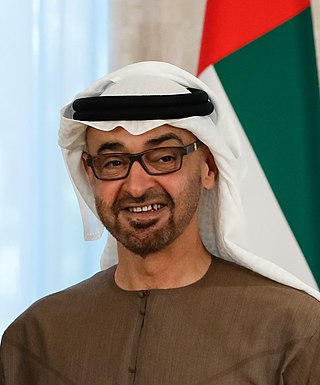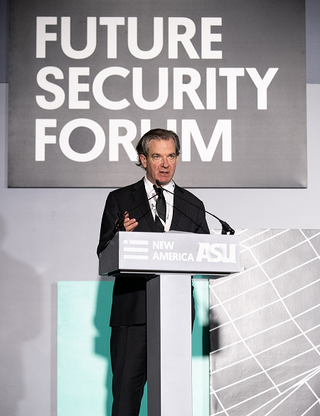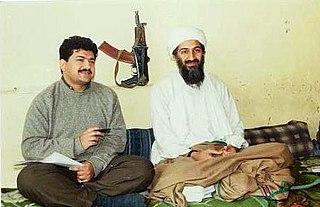Related Research Articles
![<span class="mw-page-title-main">Al-Qaeda</span> Pan-Islamic Sunni Jihadist [[terrorist organization]] (established 1988)](https://upload.wikimedia.org/wikipedia/commons/thumb/3/30/Flag_of_Jihad.svg/320px-Flag_of_Jihad.svg.png)
Al-Qaeda is a pan-Islamist militant organization led by Sunni Jihadists who self-identify as a vanguard spearheading a global Islamist revolution to unite the Muslim world under a supra-national Islamic state known as the Caliphate. Its members are mostly composed of Arabs, but also include other peoples. Al-Qaeda has mounted attacks on civilian, economic and military targets of America and its allies; such as the USS Cole bombing, 1998 US embassy bombings and the September 11 attacks. The organization is designated as a terrorist group by NATO, UN Security Council, the European Union, and various countries around the world.

The Society of the Muslim Brothers, better known as the Muslim Brotherhood, is a transnational Sunni Islamist organization founded in Egypt by Islamic scholar and schoolteacher Hassan al-Banna in 1928. Al-Banna's teachings spread far beyond Egypt, influencing today various Islamist movements from charitable organizations to political parties.

Osama bin Mohammed bin Awad bin Laden was a Saudi-born militant who was the founder and first general emir of al-Qaeda from 1988 until his death in 2011. Ideologically a pan-Islamist, his group is designated as a terrorist group by the United Nations Security Council, the North Atlantic Treaty Organization (NATO), the European Union, and various other countries.

Sulaiman Abu Ghaith is a Kuwaiti regarded as one of al-Qaeda's spokesmen. He is married to one of Osama bin Laden's daughters. In 2013, Gaith was arrested in Jordan and extradited to the United States. In 2014, he was convicted in a U.S. federal court in New York for "conspiring to kill Americans and providing material support to terrorists" and sentenced to life imprisonment He is serving his sentence at the federal ADX Florence prison in Colorado.
War against Islam is a term used to describe a concerted effort to harm, weaken or annihilate the societal system of Islam, using military, economic, social and cultural means, or means invading and interfering in Islamic countries under the pretext of the war on terror, or using the media to create a negative stereotype about Islam. The perpetrators of the theory are thought to be non-Muslims, particularly the Western world and "false Muslims", allegedly in collusion with political actors in the Western world. While the contemporary narrative of the "War against Islam" mostly covers general issues of societal transformations in modernization and secularization as well as general issues of international power politics among modern states, the Crusades are often narrated as its alleged starting point.

Ayman al-Zawahiri was an Egyptian-born militant and physician who served as the second general emir of al-Qaeda from June 2011 until his death in July 2022.

Jama'at al-Tawhid wal-Jihad, abbreviated as JTJ or Jama'at, was an Islamic extremist Salafi jihadist terrorist group. It was founded in Jordan in 1999, and was led by Jordanian national Abu Musab al-Zarqawi for the entirety of its existence. During the Iraqi insurgency (2003–11), the group became a decentralized network with foreign fighters with a considerable Iraqi membership.

Eliot Asher Cohen is an American political scientist. He was a counselor in the United States Department of State under Condoleezza Rice from 2007 to 2009. In 2019, Cohen was named the 9th Dean of the Paul H. Nitze School of Advanced International Studies (SAIS) at Johns Hopkins University, succeeding the former dean, Vali Nasr. Before his time as dean, he directed the Strategic Studies Program at SAIS. Cohen "is one of the few teachers in the American academy to treat military history as a serious field", according to international law scholar Ruth Wedgwood. Cohen is a contributing writer at The Atlantic. He is also, with former U.S. diplomat Eric Edelman, the cohost of the Shield of the Republic podcast, published by The Bulwark.

Abdullah Yusuf Azzam was a Palestinian Islamic scholar and jihadist. Belonging to the Salafi movement, during the Soviet–Afghan War of the 1980s, he advocated defensive jihad by Muslims worldwide to help the Afghan mujahideen fight against the Soviet forces and Afghan Government forces in the Democratic Republic of Afghanistan.
Michael F. Scheuer, is an American former intelligence officer for the Central Intelligence Agency, blogger, author, commentator and former adjunct professor at Georgetown University's Center for Peace and Security Studies. One assignment during his 22-year career was serving as Chief of the Bin Laden Issue Station from 1996 to 1999. He also served as Special Advisor to the Chief of Alec Station from September 2001 to November 2004.

Sheikh Mohamed bin Zayed Al Nahyan, popularly known by his initials as MBZ, is an Emirati royal and politician who currently serves as the third president of the United Arab Emirates and the ruler of Abu Dhabi.

Peter Lampert Bergen is a British and American-based United States journalist, author, and producer who is CNN's national security analyst, a vice president at New America, a professor at Arizona State University, and the host of the Audible podcast In the Room with Peter Bergen.

The Islamic State (IS)—also known as the Islamic State of Iraq and the Levant, the Islamic State of Iraq and Syria (ISIS), and by its Arabic acronym Da'ish—is a Salafi jihadist transnational Islamist terror group and former unrecognised quasi-state. Its origins were in the Jai'sh al-Taifa al-Mansurah organization founded by Abu Omar al-Baghdadi in 2004, which fought alongside al-Qaeda during the Iraqi insurgency. The group gained global prominence in 2014, when its militants conquered large territories in northwestern Iraq and eastern Syria, aided by the Syrian civil war. By the end of 2015, it ruled an area with an estimated population of twelve million people, where it enforced its interpretation of Islamic law, administered an annual budget of more than US$1 billion, and had more than 30,000 fighters under its command. After years of intense and grinding combat with American, Iraqi, and Kurdish forces, by 2019 it had lost all its Middle Eastern territories and returned to insurgency tactics in the regions it once controlled, operating from remote hideouts and continuing its propaganda efforts, which have gained it a strong following in northern and Sahelian Africa.

Hamza bin Osama bin Mohammed bin Awad bin Laden, better known as Hamza bin Laden, was a Saudi Arabian-born member of Al-Qaeda. He was a son of Al-Qaeda leader Osama bin Laden, and, following his father's death in 2011 and the attacks on the World Trade Center in New York City, he was described as an emerging leader of the Al-Qaeda organization.

Osama bin Laden took ideological guidance from prominent militant Islamist scholars and ideologues from the classical to contemporary eras, such as Ibn Taymiyya, Ibn al-Qayyim al-Jawziyyah, Sayyid Qutb and Abdullah Azzam. During his middle and high school years, bin Laden was educated in Al-Thager Model School, a public school in Jeddah run by Islamist exiles of the Muslim Brotherhood; during which he was immensely influenced by pan-Islamist ideals and displayed strict religious commitment. As a teenager, bin Laden attended and led Muslim Brotherhood-run "Awakening" camps held on desert outskirts that intended to raise the youth in religious values, instil martial spirit and sought spiritual seclusion from "the corruptions" of modernity and rapidly urbanising society of the 1970s in Saudi Arabia.

The September 11 attacks were carried by 19 hijackers of the Islamist militant organization al-Qaeda. In the 1990s, al-Qaeda leader Osama bin Laden declared a holy war against the United States, and issued two fatāwā in 1996 and 1998. In the 1996 fatwā, he quoted the Sword Verse. In both of these fatāwā, bin Laden sharply criticized the financial contributions of the American government to the Saudi royal family as well as American military intervention in the Arab world.

Ali Muhammad al-Sallabi, or al-Salabi is a Muslim historian, religious scholar and Islamist politician from Libya. He was arrested by the Gaddafi regime, then left Libya and studied Islam in Saudi Arabia and Sudan during the 1990s. He then studied in Qatar under Yusuf al-Qaradawi and returned to Libya during the 2011 overthrow of Gaddafi and distributed weapons, money, and aid to Islamist groups in the country. His actions were criticized by members of the internationally recognized Libyan government under the National Transitional Council who he in turn criticized as being secular.

The Foundation for Defense of Democracies (FDD) is a 501(c)(3) non-profit think tank and a registered lobbying organization based in Washington, D.C., United States.
Qatar has been accused of allowing terror financiers to operate within its borders, which has been one of the justifications for the Qatar diplomatic crisis that started in 2017 and ended in 2021. In 2014, David S. Cohen, then United States Under Secretary of the Treasury for Terrorism and Financial Intelligence, accused Qatari authorities of allowing financiers who were on international blacklists to live freely in the country: "There are U.S.- and UN-designated terrorist financiers in Qatar that have not been acted against under Qatari law." Accusations come from a wide variety of sources including intelligence reports, government officials, and journalists.

The Trump peace plan, officially titled "Peace to Prosperity: A Vision to Improve the Lives of the Palestinian and Israeli People", was a proposal by the Trump administration to resolve the Israeli–Palestinian conflict. President Donald Trump formally unveiled the plan in a White House press conference alongside Israeli Prime Minister Benjamin Netanyahu on 28 January 2020. The plan had been delayed by two years and previously rejected by the Palestinians, who were not invited to the meeting.
References
- 1 2 "Religious Leaders Divided Over Trump's Jerusalem Decision". NPR.org. Retrieved 2019-04-18.
- ↑ Journal, Wisconsin Muslim. "Dr. Osama Abu-Irshaid: Trump Era foreign policy and its impact on Palestine | Wisconsin Muslim Journal" . Retrieved 2019-04-18.
- ↑ "Arab Center for Research and Policy Ideas". www.dohainstitute.org. Retrieved 2019-04-18.
- ↑ "Osama Abu Irshaid". The 8th Annual Conference for Palestine in the US. American Muslims for Palestine. Retrieved 2015-12-18.